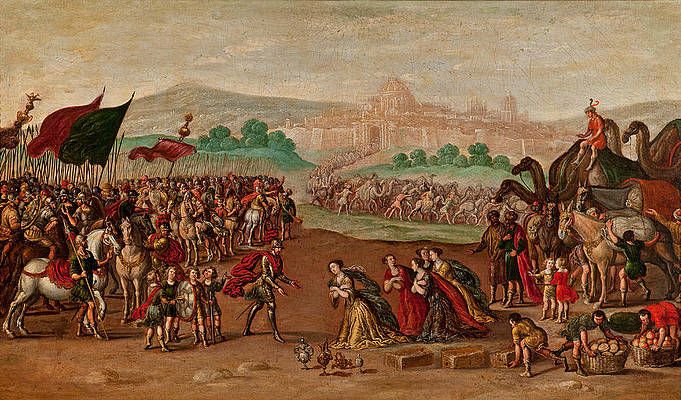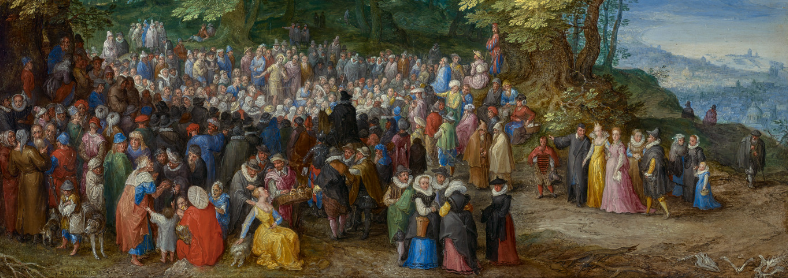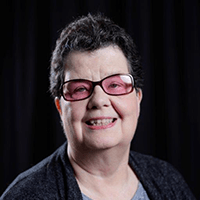Dr. Margaret Dunn is an ordained minister in the Church of God. She is serving at Mid America Christian University as an adjunct instructor and at Parkgate Community Church as a learning hour teacher for 3rd-5th grade students, a prayer partner, and a member of the missions team. She has been a member of leadership teams for the Church of God on the state and national level and was a member of the planning team for the 3rd, 4th, and 5th WHWC conferences. She lives in Pasadena, Texas.
Abigail: Women of Faith Series
Rev. Dr. Margaret Dunn • November 17, 2021 | WHWC
Beautiful, Wise, and Brave Responder to Life’s Circumstances

Abigail’s Story
1 Samuel 25 begins with the recording of the death of Samuel and the time of mourning. David and his men were moving from their stronghold to the wilderness of Paran and were passing by Maon, a city in the hill country of Judah. We are introduced to Nabal and his wife Abigail in verse three. Abigail means my father’s joy or happiness in Hebrew. We meet her in verse 3. She is the wife of Nabal (whose name means fool) who was a very wealthy man and described as harsh and surly (NASB). He owned 3000 sheep and 1000 goats. He and his men were shearing his sheep in Carmel. Their home was in Moan and the business in Carmel. Both are shown on this map. https://bibleatlas.org/full/maon.htm.
David and his men had protected Nabal and his men when they were shearing sheep in Carmel. David sent his men to Nabal for a payment for their service of protecting Nabal and his men. It was a very polite request (vs. 7-8) but was met with a very surly rebuff (vs. 8-11). David responded by putting on his sword and having four hundred of his men put on theirs. Nabal’s men knew what was going to happen and one of them went to tell Abigail about the situation they found themselves in as a result of a request for hospitality, a rebuff, and now a possible attack.
Abigail, who is described as beautiful in appearance and intelligent, did not delay but intervened with quick action. She took two hundred loaves of bread, five sheep, five measures of roasted grain, a hundred clusters of raisins, and two hundred cakes of figs and had them loaded on donkeys. She asked her young men to go ahead of her and did not tell Nabal what she was doing. She met David and his army, got off the donkey, and fell at David’s feet and began to intercede on behalf of her household. She spoke wise words to David and “her speech is one of the longest speeches of a woman recorded in the Old Testament” (Mowczko, 2013).
She said:
“Pardon your servant, sir. Please let me speak to you. Listen to what I’m saying. Let me take the blame myself. Please don’t pay any attention to that evil man Nabal. His name means Foolish Person. And that’s exactly what he is. He’s always doing foolish things. I’m sorry I didn’t get a chance to see the men you sent. Sir, the Lord has kept you from killing Nabal and his men. He has kept you from using your own hands to get even. So may what’s about to happen to Nabal happen to all your enemies. May it happen to everyone who wants to harm you. And may it happen just as surely as the Lord your God and you are alive. I’ve brought a gift for you. Give it to the men who follow you.” (I Samuel 25:24-27 NIRV).
She ended her speech with these words.
“The Lord will do for you every good thing he promised to do. He’ll appoint you ruler over Israel. When that happens, you won’t have this heavy load on your mind. You won’t have to worry about how you killed people without any reason. You won’t have to worry about how you got even. The Lord your God will give you success. When that happens, please remember me.” (I Samuel 25: 20-31 NIRV).
In this speech we see that she asked David for forgiveness, she said her husband is a fool, she offered him the gift, told him he will be king and that when he is king he will not want to think about those he killed to get even. David accepted the gift and indicated that he will not kill Nabal and his household. Abigail returned to Nabal and found him to be drunk. She waited until the morning to tell him what she had done. His heart grew hard and ten days later he died.
David told Abigail.
“Praise be to the Lord, the God of Israel, who has sent you today to meet me. May you be blessed for your good judgment and for keeping me from bloodshed this day and from avenging myself with my own hands” I Samuel 25:32-33 (NIRV).
This passage informs us that David recognized Abigail as speaking God’s truth to him. David heard the news of Nabal’s death and asked Abigail to marry him. She did. That is the last time we read about Abigail in the Bible. So what can we learn from Abigail to apply to our lives as women and clergywomen in the 21st century?
Abigail Responded to the Situation without Delay
In her story we see that Abigail responded to danger by acting without delay. She understood the request David made and believed the best course of action would be to provide David and his men with the hospitality they had requested. She responded and did not react. She remained externally calm in front of her household as they helped her quickly prepare the meal for David and his army.
When we are in the midst of a conflict or tense situation, we can learn to respond as Abigail. When we respond instead of react, our actions are measured and our emotions are under control. One of my mentors gave me this advice years ago when he told me that I needed to learn how to respond and not react when I was dealing with conflict, an opposing opinion, or with a person who was not being kind to me. I have learned to do things like counting to five or ten before speaking and it has helped me immensely. I see that Abigail responded and then took action quickly.
Abigail Spoke the Truth to David
This chapter began with the acknowledgement of Samuel’s death. Samuel was the prophet that David had recognized as speaking God’s truth. In this passage, David recognized Abigail as being a voice of wisdom for his life and ministry. As we live and listen to God we need to speak the truth kindly to others when God directs us.
Abigail spoke the truth by telling David the consequences of his planned killing of Nabal’s household. She appealed to his future regrets of this planned action. She said these words in a way which David could hear them. When we speak the truth to others, do we speak it in a way which can be received and heard by them? This is a lesson we can learn from Abigail.
Abigail Acknowledged Nabal’s Foolishness
Abigail admitted that Nabal was a foolish man and that he was always doing foolish things. She did not excuse his behavior, she did not rationalize why he was the way he was. She said “His name means foolish.” One might say that she threw him under the bus and then told him about it. There could be a debate about the apparent lack of submission of Abigail to her husband, but she did what was right to protect their household, their business, and to save their lives. This was a courageous act on Abigail’s part as she saved the lives of many and saved David from having regret in the future.
To say that this act was unappreciated by Nabal is an understatement. His heart grew hard and he died. So what about us? Are there toxic relationships in our lives that we need to acknowledge and set up boundaries to protect ourselves and others? Do we refuse to see the faults of our family members or make excuses for their behavior? While I may not want everyone to know that a family member has a problem, I need to acknowledge it to God and a trusted friend. God and my trusted friend can help me deal with whatever the problem is and to be like Abigail in knowing when I need to take action and when I should not.
Abigail Thought about the Needs of Others Before She Thought of Her Own
In her courageous action, Abigail was thinking about the future of her household, her husband’s business and not of the possible consequences for her own life. David could have killed her when she approached him. Nabal could have thrown her out of the house when she told him what she had done and she would have been disgraced. Scripture does not record any of these thoughts or any what if’s when she acted. She acted.
When we are faced with a conflict or difficult decision, what questions do we ask? Do we ask questions looking at us or looking at the bigger picture and the needs of all involved in the decision? Do we consider when evaluating a change in program or policy, what the effects will be on all those involved? In recent months, I have seen many churches make decisions based on the needs of all and not just the needs of some. Churches have decided to keep online services going so those who still felt more comfortable self-isolating can participate in worship services. Conventions have been both in person and virtual so more can participate.
Abigail Moved Forward with Courage and Trusted God
When God calls us to action, calls us to make a decision, or to do something; how do we respond? Do we move forward with courage or wait for more signs of the actions to take? Had Abigail waited, the results would have been bad. She discerned the time to act was now and did.
It was not easy (look at the size of the meal she prepared), but she acted. When I discern that now is the time to act, what do I do? I pray that I will respond like Abigail in these situations. I pray that you will too.
Final Thoughts
Abigail was in a toxic relationship when we met her. She is described as wise and beautiful. We see that she acted without delay once she saw the problem. We see that she spoke the truth. She acknowledged the faults of her family members and did not make excuses for Nabal. She thought about the needs of others before her own. She moved forward with courage and trusted God.
God saw Abigail and met her needs and she was blessed to become David’s wife after Nabal’s death. May we respond to life’s difficult situations with such courage based on Biblical truth and think of others as we decide upon our response. May we know that we are beautiful to those who love us, and are created beautiful in the eyes of God. When we lack wisdom, may we not shrink back but ask God for wisdom as James tells us in his epistle.
References
Bolinger, Hope. (2020) Who Was Abigail in the Bible? Christianity.com. Retreived from https://www.christianity.com/wiki/bible/who-was-abigail-in-the-bible.html
August 6, 2021
McDaniel, Debbie (2019) Five Things All Women Can Learn From Abigail in the Bible. IBelieve.com Retrieved from https://www.ibelieve.com/faith/things-women-learn-from-abigail-bible.html
August 6, 2021.
Mowczko, Marg (2013) Abigail: A Bible Woman with Beauty and Brains. Retrieved from https://margmowczko.com/abigail-1-samuel-25/
August 6, 2021.
Poiner, Gina M. (No Date) What Abigail in the Bible Can Teach Us About Strength. Equipping Godly Women Website. Retrieved from https://www.ibelieve.com/faith/things-women-learn-from-abigail-bible.html
August 6, 2021.

Enjoyed this article? Connect with us on one of our social media platforms. Share it and forward it to a friend:

Wesleyan Holiness has a rich and diverse history of women empowered by the Holy Spirit following God in obedience to Him, blocking out the voices of those who didn't embrace or encourage women preachers. Each one of them are the women whose shoulders we stand upon, making way for the next generation of women pastors coming up behind us.

The wonderfully freeing truth we have in the Beatitudes is that they are not a checklist of to-dos and rules to hem us in, keep us in line, or that we must check off. The Beatitudes are words given to us as grace, dripping like honey from a honeycomb with blessing and hope in a desperate and broken world.



